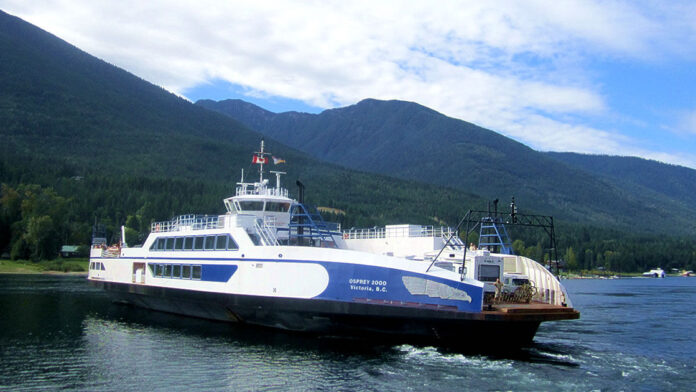The BC General Employees Union is calling on the province to take a stronger role in regulating inland ferry services, following a bitter five-month labour dispute that severely impacted Kootenay Lake communities.
Special Mediator Vince Ready was appointed by the Ministry of Labour to help the BCGEU and Kootenay Lake ferry operator Western Pacific Marine close what he called the “Himalayan gulf” between the two parties on wage rates, scheduling, and other issues.
The union and employer began negotiations for a new collective agreement in May 2024, which ultimately led to a nearly five-month-long strike that significantly impacted Kootenay Lake communities.
Ready issued his final report on the dispute on June 10, laying out 17 binding recommendations related to wages, scheduling, training, and certification requirements.
Around 90 proposals were tabled – mostly from the union – before Ready got involved.
Sixty were resolved during bargaining and mediation, while the remaining 17 were left to Ready to decide.
Wages
The union was pushing for wage increases of 9 per cent, 7 per cent, and 8 per cent over three years, which Ready deemed “excessive.”
“Upon closer review of the existing wage rates at BC Ferries, I find the union’s wage proposal is excessive because, in some classifications, it would result in wage differentials in excess of what BC Ferries pay for similar work of a similar nature.”
Instead, Ready recommended a tiered wage increase:
- 2024: 3 per cent for senior classifications; 5 per cent for all others
- 2025: 3 per cent for senior classifications; 4 per cent for others
- 2026 & 2027: 3 per cent for all classifications
Ready also noted that WPM had already been paying higher-than-average wages in recent years.
He said the union’s initial wage proposal would have resulted in some classifications earning more than their BC Ferries counterparts.
“As an example, the wage rates for Oiler, Marine Clerk, Terminal Attendant, and Deckhand would, if adopted from the union’s proposal, result in significantly higher wages for similar work at BC Ferries.”
Scheduling
One of the most contentious issues in the labour dispute surrounded scheduling.
The union was pushing to replace the current six-on, three-off shift model with a day-for-day system (seven days on, seven days off).
Ready sided with the union on this issue, requiring the seven-on-seven-off model be implemented across all vessels by January 1, 2026, with final scheduling details to be resolved by September 30, 2025, or face arbitration.
BCGEU president Paul Finch said that while the union doesn’t agree with all of Ready’s recommendations, it’s pleased with the shift to this scheduling model.
“One of the key things driving this shift to day-for-day scheduling is it ultimately benefits these communities. You have a larger pool of people to pull from if somebody gets sick. If they’re unable to work, there’s a larger group to draw on to run and operate this service.”
Rebuilding trust
Ready also emphasized the need for both sides to repair their relationship and rebuild trust with the community to avoid further labour disruptions.
“There can be no question that the strike caused considerable hardship to the communities who were required to endure the bitter and protracted five-month strike with only minimal sailings and, at times, cancelled sailings without notice,” said Ready.
“I urge the parties to collaborate on rebuilding the trust between them necessary for ensuring the sustainability of Kootenay Lake’s essential transportation network.”
He recommended that both sides engage in a special mediator once again to issue non-binding recommendations before job action is taken.
Finch said while the work of community relations is predominantly that of the local bargaining team, he emphasizes that the union looks forward to continuing to provide a safe and reliable service.
Essential services and privatization
Finch also criticized the Labour Relations Board’s definition of essential service levels during the strike, saying it allowed for unreasonable delays in reaching a resolution.
“What fundamentally occurred here was the Labour Board made some significant, crucial, and fundamental errors in terms of how they interpreted essential services,” said Finch.
“It created a situation that ended up prolonging the strike. We believe the essential service levels were inappropriate. These inland ferries are a critical part of our transportation infrastructure in the province.”
He also questioned whether a private operator should be allowed to “hold these communities hostage in the interest of having a better profit margin than a near competitor.”
“This is an inevitable and predictable consequence of privatizing the inland ferry services. You create these potentials for inequities between operators,” said Finch.
“Whereas if it were a public service, you would have a pattern agreement, and there wouldn’t be disputes across multiple communities around different provisions and wage rates.”
Finch said the union is committed to faithfully implementing the terms of the new collective agreement, acknowledging the importance of having a resolution in place.
Ready’s recommendations will be incorporated into the new collective agreement, set to run until March 31, 2028, taking effect retroactively as of April 1, 2024.
Be the first to know! Don’t miss out on breaking news and daily updates in your area. Sign up to MyNelsonNow News Alerts.





